Introduction to Homer’s Iliad (6 vols.)
Digital Logos Edition
Overview
Experience an ageless epic of Greek verse the way its original readers would have, with the Introduction to Homer’s Iliad. This collection is perfect for both students and enthusiasts interested in reading this timeless treasure in the original Greek for the first time. In addition to the Loeb Classical Library editions of the Iliad, this collection includes Clyde Pharr’s Homeric Greek—a comprehensive introduction to reading Greek, and Homer specifically, designed to kick-start comprehension of the text. Rounding out the collection is George Autenreith’s Homeric Dictionary for Schools and Colleges, fine tuned for use alongside the Iliad, featuring illustrations, references to Homer’s verse, and extensive lexicography.
No literary or historical library is complete without the Iliad, one of Homer’s inaugural works of Western literature. The themes and artistry of this epic poem resonate through thousands of years of mythology, philosophy, drama, poetry, and prose. Telling the timeless stories of the great Achilles, the beautiful Helen, and wily Odysseus, Homer eloquently comments on the mortality and morality of mankind.

- Equips classical enthusiasts to engage Homer in the original Greek
- Provides a contemporary Greek language textbook and basic lexicon designed for reading Homeric Greek
- Includes the Iliad in the Loeb Classical Library edition
The Introduction Series equips beginners to engage the likes of Plato, Homer, and Virgil in the original Greek and Latin. Each collection contains authoritative editions of the original language manuscript with an English translation, and a contemporary Greek/Latin language textbook as well as a basic lexicon, selected to fit the text at hand. It has never been easier for lovers of the classics to study these texts in their original language. Start using Logos, and discover the classics with the eyes of an expert.
- Title: Introduction to Homer’s Iliad
- Volumes: 6
- Pages: 1,958
- Resource Type: Ancient Texts
- Topic: Homer
- Homeric Greek: A Book for Beginners by Clyde Pharr
- Iliad, vol. 1 translated by A.T. Murray
- Iliad, vol. 1: Greek Text by Homer
- Iliad, vol. 2 translated by A.T. Murray
- Iliad, vol. 2: Greek Text by Homer
- A Homeric Dictionary for Schools and Colleges by Georg Autenrieth and Isaac Flagg
This title is included in the following collections
You can save when you purchase this product as part of a collection.
Greek Classics Research Librar...
$599.99$599.99
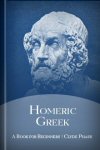
This classic text provides you with a comprehensive introduction to Homeric Greek. Clyde Pharr’s distinct grammar offers thorough instruction on Classical Greek through reading one of the greatest literary works of all time—Homer’s Iliad. In addition to covering standard grammatical and lexical categories, Pharr provides reading lessons from excerpts of the Iliad for guided lesson application. He also includes a helpful introduction to Homer and the study of Classical Greek, several review sections summarizing the grammar’s content, and a brief introduction to Attic Greek. Both Greek-English and English-Greek vocabulary lists are provided for easy reference.
Clyde Pharr (1885–1972) was professor of Greek and Latin and head of the classics department at Vanderbilt University. He was also emeritus research professor of classics at the University of Texas, Austin. Pharr did his doctoral work at Yale and postdoctoral studies at several European schools, including the University of Berlin and the American School of Classical Studies at Athens.
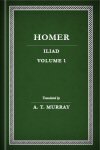
Iliad, vol. 1
- Author: Homer
- Translator: A.T. Murray
- Series: Loeb Classical Library
- Publisher: Harvard University Press
- Publication Date: 1924
- Pages: 304
This volume contains A.T. Murray’s English translation of the first volume of Homer’s Iliad.
Augustus Taber Murray (1866–1940) was born to a Quaker family in New York City. He graduated from Haverford College in 1885 and earned a PhD from Johns Hopkins University in 1890. He also studied at the universities of Leipzig and Berlin. In 1892, he became a professor of Greek at Stanford University, where he remained for the rest of his life. He was also on the managing committee of the American School of Classical Studies in Athens, Greece, for 30 years.
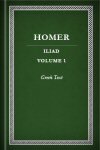
Iliad, vol. 1: Greek Text
- Author: Homer
- Series: Loeb Classical Library
- Publisher: Harvard University Press
- Publication Date: 1924
- Pages: 304
This volume contains the Greek text of the first volume of Homer’s Iliad.
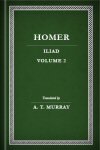
Iliad, vol. 2
- Author: Homer
- Translator: A.T. Murray
- Series: Loeb Classical Library
- Publisher: Harvard University Press
- Publication Date: 1925
- Pages: 328
This volume contains A.T. Murray’s English translation of the second volume of Homer’s Iliad.
Augustus Taber Murray (1866–1940) was born to a Quaker family in New York City. He graduated from Haverford College in 1885 and earned a PhD from Johns Hopkins University in 1890. He also studied at the universities of Leipzig and Berlin. In 1892, he became a professor of Greek at Stanford University, where he remained for the rest of his life. He was also on the managing committee of the American School of Classical Studies in Athens, Greece, for 30 years.
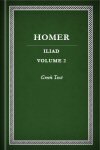
Iliad, vol. 2: Greek Text
- Author: Homer
- Series: Loeb Classical Library
- Publisher: Harvard University Press
- Publication Date: 1925
- Pages: 328
This volume contains the Greek text of the second volume of Homer’s Iliad.
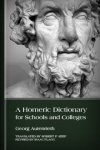
This standard Homeric Greek dictionary combines extensive lexicography with pictorial illustrations, providing scholars and students with strong, contextual impressions of this important dialect. Word entries list related nouns and verbs for conceptual coherence in vocabulary acquisition. Verb entries list tense and voice forms for easy reference. The dictionary also includes Homeric hapax legomena. This dictionary, optimized for use with Homeric Greek texts, references where words occur in the Iliad and Odyssey. Rather than being left to imagine a word’s referents and contexts, you’ll see 130 images providing visually and culturally rich illustrations of hundreds of words for maximum semantic content. This volume also offers a linguistic orientation to Homeric Greek with an overview of its unique features.
Isaac Flagg (1843–1931) was professor of Greek at Cornell University from 1871 to 1888 and professor of classical philology at the University of California, Berkeley, from 1891 to 1909, after which he was made professor emeritus.
Robert P. Keep (1844–1904) was an instructor at the Norwich Free Academy in Norwich Connecticut.
Homer (ca. 8th century BC) is the subject of intense debate regarding his life and origins. No solid biographical information exists for Homer, though legends abound. His name is related to a Greek word meaning “blind,” giving rise to the tradition of Homer as the blind bard. Many modern scholars dismiss the notion of Homer as a single author, arguing that the works attributed to him are based on many generations of oral story telling. When speaking of Homer, these scholars are referring to the date in which the works attributed to Homer were created. Some scholars suggest that Homer refers to the function of redacting oral tradition into a coherent whole.